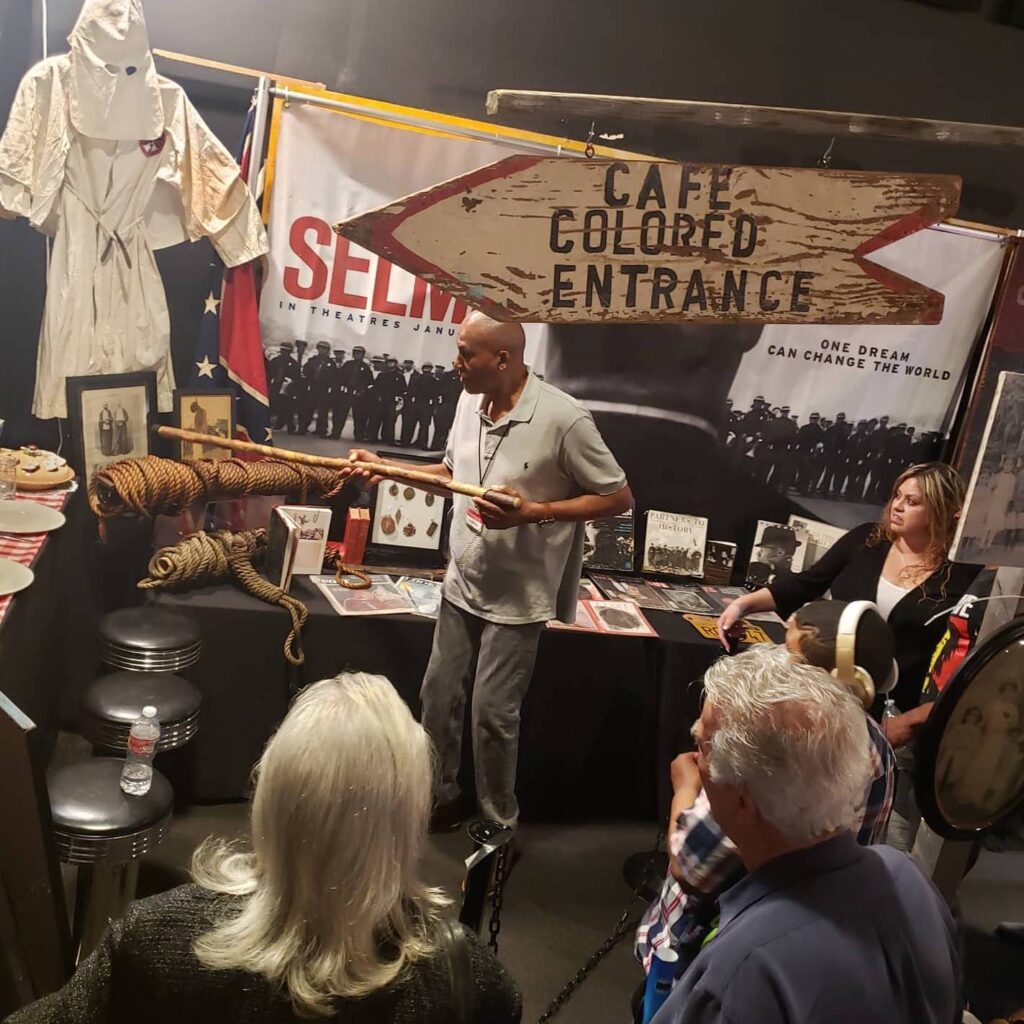
“Forgotten Images” a 10,000+ artifact collection will be part of a powerful event scheduled for March 24 through 26 on the CSUCI campus called “An American Journey.” Courtesy photo.
CAMARILLO — With shackles and bullet holes, a child’s Ku Klux Klan outfit, and signs reading “Colored only,” the collection called “Forgotten Images” is raw, unblinking and authentic.
“You look at these images and you can’t help but have some kind of emotion evoked,” said CSU Channel Islands (CSUCI) Outreach and Engagement Librarian Lydia Collins. “I hope it will create opportunities for authentic dialogue and disruptive discourse that leads to positive changes and helps us learn about one another.”
“Forgotten Images” is a 10,000+ artifact collection that will be part of a powerful event scheduled for March 24 through 26 on the CSUCI campus called “An American Journey.”
The travelling exhibit will be set up in the Grand Salon for students and the public to view. Coordinated visits from students in area schools are also planned. This will be one of the first major community events occurring on campus as CSUCI re-opens after the worst of the pandemic.
Sponsored by an Oxnard-based organization called the Juneteenth Celebration of Ventura County (JCVC), the exhibit is coming to campus thanks to the efforts of Major Gifts Officer Carrick DeHart and campus partners such as the John Spoor Broome Library.
“It takes a village to raise a child and everyone should know and understand one another’s history in the village,” DeHart said. “Thus, there’s the potential for understanding and empathy for everyone along the journey of life. It’s important that the Black experience is here in Ventura County…in all its glory and its ugly past.”
JCVC co-chair Angela Landers and her husband, Brian Landers, are working with DeHart and the John Spoor Broome Library staff to bring the event to CSUCI.
The Landers felt it was important to expose the public to the “culture, the history, the times and the trials” of the African American experience in the United States, Brian said, adding: “There are a lot of things that are relevant today that stem from this systemic racism.”
“It’s extremely important to bring this exhibit to the forefront and let people know we are all a part of American history,” Angela said. “History should not be selective. I hope and pray this is an eye-opening experience that gives us the opportunity to question what has been done and question what is being taught in schools.”
The artifacts were collected over many years by Oxnard native David McLucas and his wife, Sharon, who first met in 1969 while both were attending CSU Long Beach. They reunited years later and began attending estate sales and auctions collecting more than 20,000 pieces of African American history, spending more than $500,000 over the years.
“Most exhibits are politically correct; our exhibit is in your face,” David told a Long Beach media outlet.
Collins, who was charged with an American Journey exhibit now on display in the library, believes the jarring nature of many of the pieces is necessary as racism—both subtle and overt—persists in 2022.
“When I look at the visuals, the tone of some of the items really stuck out to me, like the ‘For colored only’ signs,” Collins said. “As a Black woman, I feel like it’s still there. There are places where I don’t feel I belong, and when I see these images of ‘for colored’ and ‘for whites’…We are in 2022 and sometimes I still feel that way.”
Collins has encountered racism numerous times during her life. One of the most terrifying was during the 1990s when Collins and her toddler daughter were picking apples with friends in a Maryland orchard.
“Suddenly my two-year-old daughter asked: ‘Why are those people riding on horses like ghosts?’” Collins said. “I had to say to her ‘Those are not ghosts.’ The Klan was there. My friends covered us up with a blanket and we got in the back seat and my colleagues drove us out of there.”
Painful, terrifying and sickening, but Collins believes this exhibit will help others understand that moments like this have existed for hundreds of years, and will continue to exist until exhibits like this help us all face every aspect—from slavery to the first Black American U.S. President—of our shared history.
For exhibition hours or to register for this event, visit: http://bit.ly/35aeyZI
About California State University Channel Islands — CSU Channel Islands (CSUCI) is reimagining higher education for a new generation and era. We are an innovative higher education institution that enables students to succeed and thrive – serving as an engine for social and economic vitality that provides the intellectual resources necessary for a thriving democracy. With more than 7,000 students, 1,200 employees and 14,000 alumni, CSUCI is poised to grow in size and distinction, while maintaining one of the most student-focused learning environments in public higher education. Connect with and learn more by visiting www.csuci.edu or CSUCI’s Social Media.
The University encourages persons with disabilities to participate in its programs, events and activities. If you anticipate needing any type of accommodation, or have questions about the physical access provided, please contact the respective area below as soon as possible, but no later than seven (7) business days prior to the event/activity:
CSUCI Students
Disability Accommodations & Support Services: accommodations@csuci.edu
CSUCI Employees
Human Resources: angela.portillo@csuci.edu
Members of the Public
Title IX & Inclusion: titleix@csuci.edu
